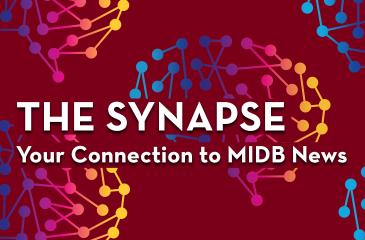The Synapse Feb. 2021
A Message from MIDB Co-Directors
Welcome to our first monthly newsletter of the MIDB!
We are excited to work with you to establish MIDB as a model for how to do translational, integrative, and community work, including opening information channels between experts, gaining feedback from the community about research questions, and integrating basic science research findings into clinical care. Together, we can break down the silos and barriers that prevent that information flow from being as efficient as possible.
MIDB was established to provide opportunities for scholars across intersecting disciplines, community partners, and policy makers to share resources, integrate existing talent, foster new collaborations, and pioneer new research and service delivery approaches to improve early brain health and to ensure optimal adult outcomes. By bringing together researchers and clinicians from across the University of Minnesota, we will set and maintain a healthy trajectory for all children toward positive life outcomes through studying the process of brain development, how it stays on the rails, how it goes off the rails, how early we can tell, and how early we can intervene.
We hope you enjoy this first issue of “The Synapse” - our goal with this monthly newsletter is to make connections and increase communication between the departments and initiatives that are partnering in MIDB. The newsletters will highlight programs and provide updates on the progress we are making as MIDB continues to develop. We invite you to send your feedback, and submit your own news and announcements to include in future issues.
We appreciate all of your efforts to help bring MIDB to life. We especially want to thank Medical School Dean and VP for Clinical Affairs Jakub Tolar, former CEHD Dean Jean Quam and Interim CEHD Dean Michael Rodriguez, Minnesota Masonic Charities and the Lynne & Andrew Redleaf Foundation for their pivotal support that made this possible. While COVID has presented an unexpected challenge, progress has remained steady and on schedule, and it has been exciting to see us all coming together. We look forward to making more connections, and officially opening our doors in the fall!
Thank you for being part of MIDB and for your dedication to fostering the healthy brain function of children across the lifespan.
Damien Fair, PA-C, PhD, and Michael Georgieff, MD
MIDB Co-Directors
MIDB: Making Sure Every Child Gets the Best Start
The MIDB recently launched an introductory video to highlight how we are bringing together University of Minnesota experts in developmental brain research and child health to understand, prevent, diagnose, and treat neurodevelopmental disorders in early childhood and adolescence. Check it out and please share.
Meet MIDB’s Executive Council
The MIDB Executive Council is an advisory group of primary stakeholders in the Medical School and College of Education and Human Development. This group meets regularly to help inform and uphold MIDB’s basic tenet that investment in early childhood brain health is an investment in society going forward. Learn more about our Executive Council.
New Support for TeleOutreach
The Richard M. Schulze Family Foundation has awarded a $2 million, multi-year grant to the University of Minnesota Foundation to support teleoutreach services through MIDB. The University’s Institute on Community Integration, as a MIDB partner, will lead the creation of the MIDB TeleOutreach Center over the next three years, bringing together clinical pediatric providers and developmental specialists to reach underserved communities around the state with convenient and cost-effective services.
Scientific Cores To Support Bench-to-Bedside-to-Community Discovery
The collaborative work in MIDB leverages the enormous potential and plasticity of the young brain and the emerging knowledge in precision medicine to advance basic, preventative, translational, and applied science—along with clinical management, community services and effective policy—for all youth in a culturally sensitive context. To support this work, several research cores comprised of numerous labs, institutes, and research centers will soon be launched. These cores will focus on community engagement, human phenotyping, neuroimaging, and more. Learn more about MIDB’s research cores.
March Of Dimes Names Michael Georgieff As 2020 Agnes Higgins Award Recipient
Michael Georgieff received the 2020 Agnes Higgins Award from the March of Dimes for his pivotal research linking iron deficiency early in life and long-term mental health. The award recognizes distinguished achievement in research, education or clinical services in maternal-fetal nutrition. See news release.
Get to Know Co-Director Damien Fair
Beyond Damien Fair’s groundbreaking ADHD and autism findings, he’s fighting racism in academia and getting real on Twitter. Read more about his research and activism in this month’s Minnesota Monthly story, This U of M Brain Science “Genius” Has Justice on His Mind.
Meeting of the Minds
Sophia Vinogradov is quick to point out what’s missing in her field, psychiatry. “Neuroscience,” she says simply. As head of the Medical School’s Department of Psychiatry and Behavioral Sciences, she knows this seems counterintuitive. Why wouldn’t neuroscience—the study of how the brain functions—play an integral role in caring for people with mental illnesses? “It sounds obvious, but it’s not actually what’s happening,” says Vinogradov. Too rarely, she says, do experts from both fields join forces. Learn more about how she and neuroscientist A. David Redish are working to change that.



